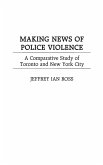America does not have a tradition of violence, but it does have a history of violence that can be traced through struggles and popular causes that date from colonial times to the modern era. The psychology of private violence by the American people is deeply ingrained in the concept of popular sovereignty. Repeatedly in American history, the peoples' deep-seated beliefs have led to confrontations and implementations of private will against the state and against groups viewed as harmful to existing values. In Vigilantism, Culberson argues for a clear-cut distinction between domestic terrorism, in which actions are taken that deny progression in the social order, and vigilantism, in which the actors are vigilant in all things social that could do harm to the progressive social order. He maintains not only that vigilantism has been the motivating social force in American politics since the founding of the United States but also that equating vigilantism with domestic terrorism denies the peoples' right to criticize and challenge the status quo or the direction of social policies. Culberson examines the American peoples' history of taking the law into their own hands and analyzes the use of this private power in three eras of American politics--Colonial, Populist, and Progressive--asserting that private power effected the transitions in creating, distributing, and maintaining socially acceptable values and norms. This extremely readable book, which takes an entirely new slant on the cyclical nature of political power and private power as a determinant of public policies, would be a stimulating addition to the reading lists of courses in Public Policy, American Government, Federalism, Criminal Justice, Political Theory/Philosophy, and others.
Hinweis: Dieser Artikel kann nur an eine deutsche Lieferadresse ausgeliefert werden.
Hinweis: Dieser Artikel kann nur an eine deutsche Lieferadresse ausgeliefert werden.








